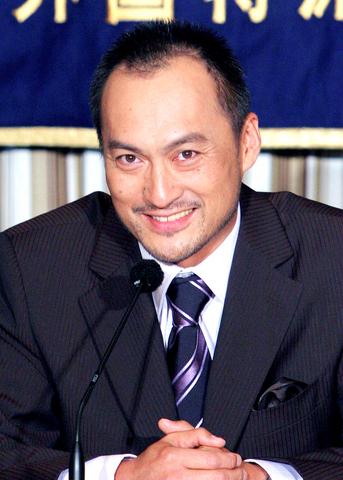Ken Watanabe is Japan's best-known actor abroad. He has starred in Hollywood films on samurai and geisha, but now he says he wants to show films less stereotypical of his country in the US.
Watanabe produced his latest Japanese-language movie, Memories of Tomorrow, and he plays the lead role of a successful businessman hit by Alzheimer's disease while still young.
"I have respect for past filmmakers who were courageous enough not to fear misunderstandings or failures" over culture, he said. "That is why as a producer I'd like to bring to the United States movies that do not feature ninjas and samurais."

PHOTO: EPA
Watanabe, 46, was nominated for an Oscar as best supporting actor for his role as the warrior Katsumoto in 2003's The Last Samurai, starring Tom Cruise.
He was also in last year's Batman Begins and Memoirs of a Geisha, in which he portrayed a rich businessman falling in love with a poor girl who becomes one of Japan's famous traditional hostesses.
Watanabe, who speaks fluent English, is one of the few Japanese stars in Hollywood. He said that before filming The Last Samurai, he feared that a US film on Japan would be rife with stereotypes.
"But during shooting we had rather fierce discussions, and as a result the movie itself became a channel through which Japanese and non-Japanese could understand one another," he said.
Watanabe said he now wants to work on films on issues of social concern, as seen in his latest work.
Watanabe is now filming one of the twin movies by Clint Eastwood which aim to depict the bloody World War II battle of Iwo Jima from both the US and Japanese perspectives. (AFP)
渡邊謙是日本最享譽海外的演員,曾參與好萊塢有關日本武士與藝妓的電影演出。不過現在他說,他想在美國呈現較無日本刻板印象的電影。
渡邊謙是他新片日文電影《明日的記憶》的製片,他也擔任主角,飾演盛年就罹患阿茲海默症的成功商人。
「我尊重過去有足夠勇氣不怕(文化)被誤解或失敗的製片,」他說:「這就是為何身為製片的我想將非關忍者和武士的電影引進美國。」
四十六歲的渡邊謙二○○三年在湯姆克魯斯主演的《末代武士》中飾演武士勝元,被提名為奧斯卡最佳男配角。
他也參與去年的《蝙蝠俠:開戰時刻》與《藝妓回憶錄》,在後者他飾演一位愛上貧窮女孩的富商,那名女子後來成為日本最知名的傳統藝妓之一。
說得一口流利英語的渡邊謙是日本少數的好萊塢明星之一。他說在演出《末代武士》前,曾擔心以日本為題材的美國電影會充斥刻板印象。
「不過拍片期間我們相當激烈地討論,結果這部電影成為日本人與非日本人間瞭解彼此的橋樑。」他說。
渡邊謙指出,他現在希望能致力於探討社會議題的電影,如他的新作一樣。
渡邊謙目前正在拍攝克林.伊斯威特的雙版本電影之一,故事同時採用美國與日本的觀點,描述二次大戰血腥的硫磺島戰役。
(法新社/翻譯:賴美君)

A: Have you seen the reality TV show “Culinary Class Wars?” B: Sure! It’s a competition between two classes: 20 celebrity chefs dubbed the “white spoons” versus 80 non-celebrity chefs dubbed the “black spoons.” A: The two judges are master chef, Paik Jong-won, and South Korea’s only three-Michelin-star chef, Anh Sung-jae. B: And the grand prize is $300 million Korean won. A: After watching the show, I really wanna have some Korean food. A: 你有看電視實境秀《黑白大廚:料理階級大戰》嗎? B: 當然啦!就是20位「白湯匙」名廚,和80位「黑湯匙」廚師的競賽。 A: 評審則是廚神白種元,及南韓唯一的米其林三星主廚安成宰。 B: 冠軍還可獲得3億韓元獎金呢! A: 看完節目後我現在好想吃韓式料理喔。 (By Eddy Chang, Taipei Times/台北時報張聖恩)

A: As reality TV show “Culinary Class Wars” causes a sensation, it may be more difficult to make a reservation at the show’s judge Paik Jong-won’s Taipei restaurant, Bornga Korean BBQ. B: The other judge, Anh Sung-jae, also served as a guest chef at Regent Taipei last June. A: Korean food has become a new trend in Taiwan lately, and restaurants such as Samwon Garden are quite popular. B: But that restaurant is so pricey. A: Then try the more affordable places, like my favorite, OKAY Korean BBQ, or others such as Annyeong Korean BBQ and OvenMaru Chicken. A:

Colorado has taken a pioneering move towards protecting consumer privacy in the age of brain-computer interfaces. With the rise of neurotechnology, which involves technology that monitors and interacts with the brain, data privacy concerns are coming to a head. In response to growing anxieties, Colorado has become the first state in the US to pass an amendment that safeguards the privacy of human brainwaves. On April 17, Colorado announced an update to its Privacy Act, which went into effect on August 6. The new Colorado Privacy Act classifies brainwaves as “sensitive personal information,” offering them the same protections that

Continued from yesterday(延續自昨日) https://www.taipeitimes.com/News/lang Neurotechnology used to be limited to scientific labs and hospital settings. However, many new devices that can record consumers’ brainwaves or analyze the brain in other ways have been launched in recent years. Often marketed outside the realm of medical equipment, these devices evade the existing safety and privacy standards for healthcare devices. Experts are raising concerns about this lack of oversight, fearing the potential for these tools to become mind-reading devices without users’ consent or knowledge. Other US states are considering similar regulations to protect their citizens in regard to neuro data gathered by technology companies. Colorado’s